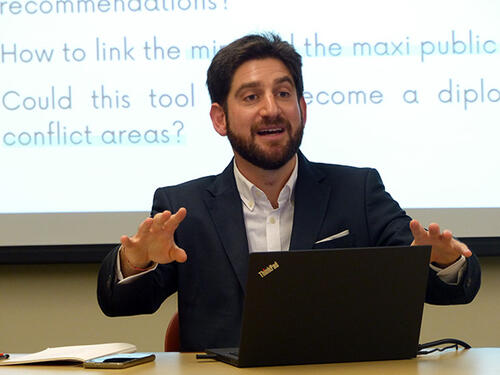Can Citizens’ Assemblies Help Restore Trust in Government?

About half of Americans believe democracy is not working well, according to an Associated Press poll from June. Only 10% said it is working well or extremely well.
The Institution for Social and Policy Studies launched its Democratic Innovations program in part to counteract such pessimism. Because democracy needs the public’s trust for it to work.
Led by ISPS Director Alan Gerber and ISPS faculty fellows and political science professors Hélène Landemore and Adam Meirowitz, Democratic Innovations serves as a laboratory to identify and test new ideas for improving the quality of democratic representation and governance.
Last week, Landemore and Theophile Penigaud de Mourgues, a postdoctoral associate with Democratic Innovations, hosted a conversation with Jonathan Moskovic, advisor in democratic innovation for the president of the French-speaking Brussels Parliament. Brussels has helped lead a growing experiment in what are known as citizens’ assemblies, deliberative bodies in which randomly selected people gather to assist in policymaking decisions.
“Finally, deliberative innovations are starting to be taken seriously in the United States,” said Landemore, who last year served on the governance committee overseeing a citizens’ convention reconsidering France’s laws on assisted suicide and euthanasia.
Landemore noted that Moskovic will participate with other foreign delegations in a parliamentary exchange session with the U.S. Congress on how deliberative citizen engagement can build a resilient democracy.
“For decades I’ve seen this discrepancy between Europe and the United States,” she said. “But I feel like today marks the beginning of when democratic innovations are being taken more seriously in this country, and one of these promising innovations is deliberative committees.”
For 541 days in 2010 and 2011, Belgium failed to form a federal government. Polls show that Belgians do not trust government institutions, political parties, or politicians, Moskovic said. Even though Belgium is one of the few countries in the world where voting is mandatory, 17% of people did not vote — or submitted an invalid or blank ballot — in the last election, Moskovic said, including as many as 40% of people in parts of Brussels.
“So, this is a crisis of legitimacy,” he said. “And a crisis of efficiency. But there is fertile soil in Belgium for innovation.”
In 2011, the Belgian government randomly selected 1,000 people to participate in a citizens’ summit known as the G1000 to advise the struggling elected federal body. And though none of the summit’s recommendations were adopted, Moskovic considered it a success for helping to cultivate a culture of participation.
“This was the first time the issue of citizens’ assemblies was on the political and media radar in Belgium,” he said. “Even today, when you mention citizens’ assemblies, people refer to the G1000. And since then, there have been many others from the local to the national level.”
The country now has four permanent citizens’ assemblies, including one to address climate change. The country’s strong Green Party has pushed to embed citizen participation throughout government, even deploying a citizens’ assembly to define their political platform.
In Brussels, the government convenes citizens’ assemblies to consider topics that are paralyzing decision-making among elected officials, Moscovic said. For example, climate activists campaigned against the introduction of 5G cellular networks, and so politicians waited for the public committee to weigh in before passing a law authorizing the technology.
Participants are selected randomly, even including those who have different nationalities. Organizers then attempt to create a cross-section of the population based on gender, age (as young as 16), geographic location, and educational level. They are then joined by 15 members of Parliament, who are members of the standing committees aligned with the topic under consideration. They meet in small groups over six weekend days, deliberating outside the public eye to promote candor and discourage grandstanding, and assisted by trained facilitators to manage power dynamics and keep the process moving.
Citizens receive payment to attend, about 83 euros a day. Parents of newborns through 12 years old receive free childcare. There has been 90% attendance.
To adopt a recommendation, a majority of citizens and a majority of the MPs need to vote in favor. And while some politicians might instrumentalize the process to blame the citizens for making a choice unpopular with some constituents, Moskovic said that more often politicians become ambassadors of the process.
“Some worried that members of Parliament would see decisions of citizen’s committees as a threat,” he said. “But here, they don’t. They co-constructed the recommendations. They understand the black box of the deliberation phase, how they came to make that recommendation. They have shared ownership of the process.”
Of the citizens participating, 82% say they have a better understanding of the political system, and 97% said they felt their participation was a positive experience.
“Bodies of citizens, broadly representative of the population and brought together to deliberate on a political issue, has been spreading for decades around the world,” Penigaud de Mourgues said. “Hopefully, thanks to Jonathan, we know more about the extent to which deliberative committees are reliable to inspire new avenues for citizen engagement and to build trust between citizens and their political representatives.”
Gerber thanked Moskovic for sharing the how Belgium has enhanced the public’s participation in their government.
“As the world faces new and evolving challenges — from rapid advances in technology, anti-democratic movements, and growing concern about the performance of government and civil society — we need people like Jonathan, Theophile, and Hélène to test new methods for how people can partake in their own governance and fortify our fraying institutions,” Gerber said. “The Democratic Innovations program supports engagement with new ideas to encourage honest, efficient, responsive, and effective government. We embrace these efforts at ISPS as we all seek a better way forward together.”